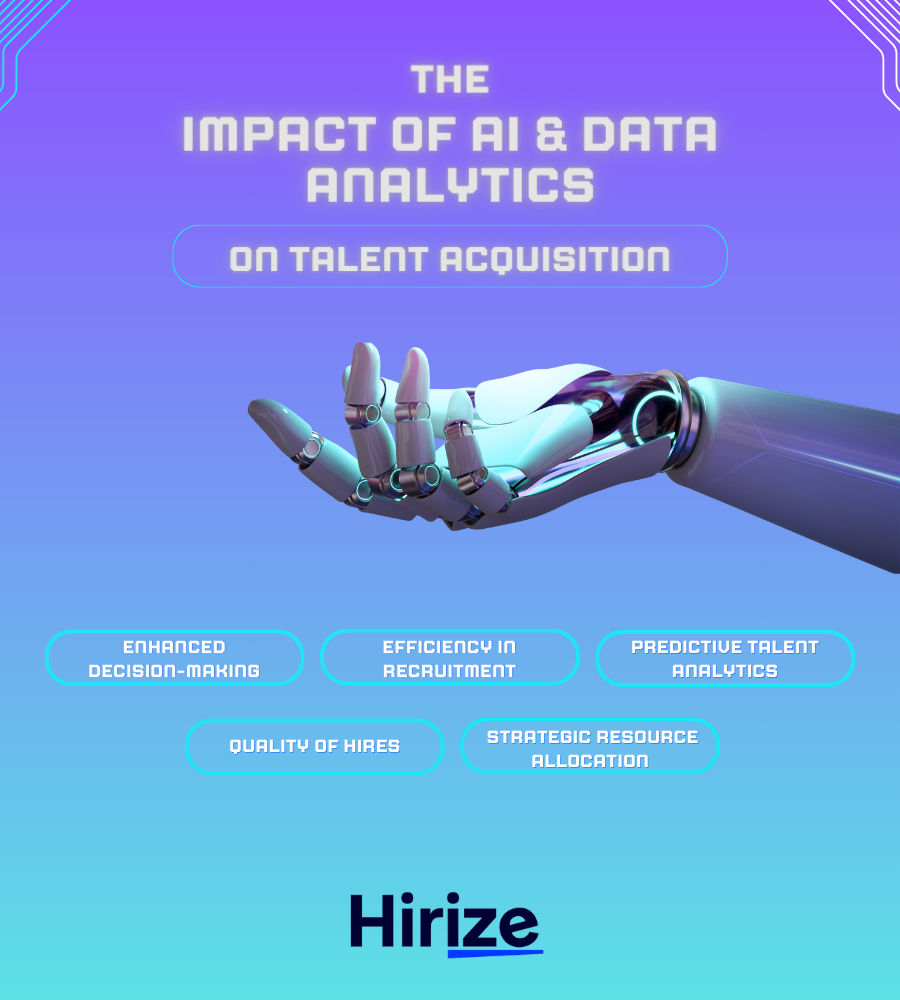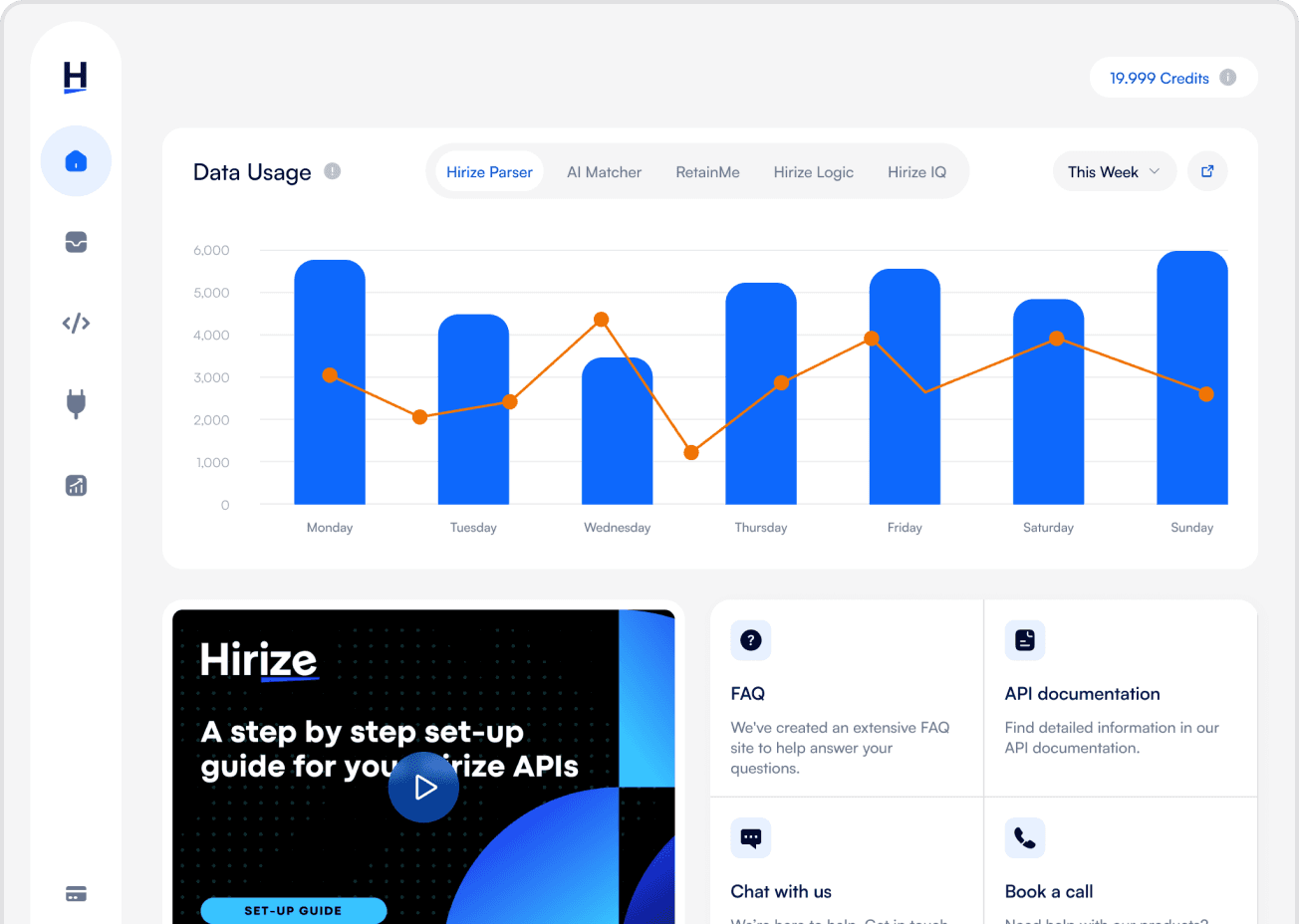superpowers?
Talent Acquisition Technology Trends in 2024
Discover the top talent acquisition technology trends for 2024, including AI advancements, diversity tech, and data-driven recruitment strategies.

The landscape of talent acquisition continues to evolve at a rapid pace, driven by groundbreaking technological advancements. For HR professionals, understanding these trends is not just beneficial; it's essential for staying competitive in the dynamic world of hiring. This article delves into the transformative power of technology in talent acquisition, promising to enhance your recruitment process in ways previously unimaginable.
In this article, you will learn:
- The transformative impact of AI and data analytics on talent acquisition.
- The growing significance of diversity and inclusion technology in recruitment.
- Effective strategies to boost candidate engagement and enhance their experience.
Data-Driven Recruiting Strategies
In the realm of talent acquisition, theadage "knowledge is power" has never been more true, thanks to the surge in data-driven recruiting strategies. The modern recruitment relies heavily on data analytics, not just to inform decisions but to fundamentally transform the hiring process. This shift towards an analytics-driven approach is empowering organizations to make more informed, strategic decisions that align with their long-term goals.
Real-time Analytics in Hiring: The integration of real-time analytics into recruitment processes enables HR professionals to gain immediate insights into key metrics such as time-to-hire, cost-per-hire, and the effectiveness of various recruitment channels. This real-time feedback loop allows for swift adjustments, ensuring resources are allocated to the most effective strategies.
Recruitment Software and Talent Analytics: Advanced recruitment software now incorporates sophisticated talent analytics, providing a deeper understanding of candidate pools and predicting future hiring needs. These platforms offer a granular view of talent acquisition performance, highlighting areas for improvement and uncovering hidden opportunities.
By harnessing the power of data, recruiters can move beyond gut feelings and anecdotal evidence, making decisions backed by solid, actionable insights. This not only streamlines the recruitment process but also significantly improves the quality of hires, ultimately contributing to the organization's success.

Candidate Engagement and Conversion Optimization
Engaging candidates effectively and optimizing for conversion are pivotal in the competitive landscape of talent acquisition. With technology at the forefront, recruiters can now personalize communication and automate key parts of the recruitment marketing process, ensuring that potential hires remain engaged and more likely to move through the hiring funnel.
Personalized Communication with Candidates: Leveraging technology to tailor communications with candidates can significantly enhance their engagement. Automated systems now enable recruiters to send personalized emails and messages based on a candidate's profile, application status, and interactions with the company. This level of personalization makes candidates feel valued and keeps them engaged throughout the recruitment process.
Recruitment Marketing Automation: Automation tools are transforming recruitment marketing by streamlining candidate outreach and follow-ups. These platforms can schedule and send out job alerts, company news, and tailored content that keeps potential candidates informed and interested in the organization. By automating repetitive tasks, recruiters can focus more on strategic aspects of talent acquisition, such as building relationships and enhancing the employer brand.
Embracing these technological advancements in candidate engagement and conversion optimization not only improves the efficiency of the recruitment process but also significantly enhances the candidate experience. This dual focus on efficiency and experience is key to attracting and securing top talent in today's job market.
Internal Mobility and Employee Retention Focus
In the evolving landscape of talent acquisition, the focus is increasingly shifting towards not just attracting new talent but also retaining and developing the existing workforce. Technology plays a crucial role in facilitating internal mobility and focusing on employee retention, thereby fostering a culture of growth and opportunity within the organization.
Career Pathing and Development Opportunities: Advanced HR technologies are enabling organizations to map out clear career paths for their employees, aligned with their skills, interests, and the company's needs. These platforms offer personalized learning and development plans, ensuring employees have the resources and opportunities to grow professionally within the company.
Leveraging Data for Retention Strategies: Data analytics tools are being used to identify patterns and predict potential employee turnover, allowing HR professionals to intervene proactively. By analyzing factors such as job satisfaction, engagement levels, and performance metrics, companies can tailor retention strategies to individual needs, significantly reducing turnover rates.
Focusing on internal mobility and retention not only enhances employee satisfaction and engagement but also reduces the costs associated with high turnover and external recruiting. By investing in technology that supports career development and retention, organizations can build a more loyal, skilled, and motivated workforce, ready to drive future success.
Prioritizing Employee Well-being and Work-Life Balance
In today's fast-paced work environment, prioritizing employee well-being and work-life balance has become essential. Technology offers innovative solutions that help organizations support their employees' mental and physical health, leading to a more engaged and productive workforce.
Mental Health and Wellness Platforms: An increasing number of companies are turning to digital wellness platforms that offer resources and tools for mental health, such as mindfulness apps, virtual counseling sessions, and stress management workshops. These platforms are easily accessible to employees, providing them with the support they need to maintain their well-being.
Flexible Work Arrangements: Technology facilitates flexible work arrangements by enabling seamless communication and collaboration, regardless of location or time zone. Tools like project management software, video conferencing, and cloud-based document sharing allow employees to work efficiently from anywhere, helping to maintain a healthy work-life balance.
By integrating these technological solutions, companies demonstrate a commitment to their employees' well-being, which is crucial for attracting and retaining talent. A focus on mental health and work-life balance not only supports employees but also drives long-term organizational success by fostering a healthy, motivated workforce.

The Rise of Artificial Intelligence in Talent Acquisition
Artificial Intelligence (AI) is transforming talent acquisition, making the process more efficient and effective. From automating repetitive tasks to providing deeper insights into candidate capabilities, AI is at the forefront of the recruitment revolution.
AI-powered HR Technology: AI is being integrated into various aspects of HR technology, from applicant tracking systems (ATS) to candidate engagement platforms. AI algorithms can screen resumes, rank candidates based on fit, and even predict future job performance, significantly reducing the time and effort required for initial screening processes. Hirize provides a resume parsing solution which you can try now.
Chatbots and Natural Language Processing: AI-powered chatbots are becoming an integral part of the candidate experience, offering instant responses to inquiries and guiding applicants through the recruitment process. Utilizing natural language processing, these chatbots can understand and interact in a human-like manner, providing personalized communication at scale.
The incorporation of AI into talent acquisition not only streamlines the hiring process but also enhances the quality of hires by ensuring a good match between the candidate's skills and job requirements. As AI technology continues to evolve, its role in recruitment is set to become even more pivotal, offering new ways to attract, engage, and retain top talent.
Employer Branding and Recruitment Marketing
Establishing a strong employer brand and effective recruitment marketing strategies is also paramount. Technology plays a crucial role in amplifying these efforts, making it possible to reach a broader audience and engage potential candidates more effectively.
Building a Strong Employer Brand: Digital platforms, especially social media, have become powerful tools for showcasing company culture, values, and employee experiences. By leveraging these platforms, companies can build a compelling employer brand that resonates with their target audience, making them an employer of choice.
Employee Testimonials and Social Media Presence: Authentic employee testimonials shared through videos, blogs, and social media posts can significantly enhance a company's employer brand. These real-life insights into the working environment and company culture provide potential candidates with a glimpse of what it's like to work for the organization, fostering trust and interest.
Effective employer branding and recruitment marketing not only attract top talent but also ensure a better fit by aligning candidate expectations with the company's culture and values. As technology continues to advance, the opportunities for innovative branding and marketing strategies in recruitment are boundless, offering new ways to connect with and captivate potential candidates.
The Evolution of Remote Work in Recruitment
The rise of remote work has fundamentally shifted the recruitment landscape, challenging traditional hiring practices and introducing new opportunities for talent acquisition. Technology has been pivotal in this transition, enabling organizations to adapt and thrive in the new normal of work.
Adapting to Remote and Hybrid Work Models: As companies embrace remote and hybrid work models, recruitment strategies have evolved to match. Video interviewing software, virtual onboarding tools, and remote skill assessment platforms have become standard in the hiring process, allowing companies to efficiently recruit talent from a global pool.
Leveraging Remote Work for Competitive Advantage: The ability to offer remote work options has become a significant competitive advantage in attracting top talent. Organizations that effectively utilize technology to support remote work are better positioned to attract candidates who value flexibility and work-life balance.
The evolution of remote work in recruitment highlights the importance of technology in facilitating seamless hiring processes and expanding access to a diverse talent pool. As remote work continues to shape the future of work, organizations that adapt their recruitment practices accordingly will lead the way in talent acquisition.
Skills and Competencies Assessment
By leveraging AI and advanced assessment tools, recruiters can more accurately match candidates with job requirements, ensuring a better fit and higher job performance.
AI in Sourcing and Matching Candidates: Artificial Intelligence is revolutionizing how candidates are sourced and matched to job vacancies. AI algorithms analyze vast amounts of data, including resumes, portfolios, and social media profiles, to identify candidates whose skills and experiences align closely with the job's requirements. This precision reduces the time spent on candidate screening and increases the quality of shortlisted applicants. Hirize also offers AI matching solution.
Advanced Assessment Platforms: Beyond traditional interviews, advanced assessment platforms are being utilized to evaluate candidates' skills through simulations, gamified tests, and task-based assessments. These platforms provide objective data on candidates' abilities, offering a more comprehensive view of their potential fit for the role.
Incorporating technology into skills and competencies assessment not only streamlines the recruitment process but also enhances its fairness and objectivity. By focusing on data-driven evaluations, organizations can make more informed hiring decisions, ultimately leading to better employee performance and satisfaction.
Diversity and Inclusion Technology
Diversity and inclusion (D&I) have taken center stage in talent acquisition strategies, with technology playing a key role in facilitating more equitable and inclusive hiring practices. By leveraging specialized tools and platforms, organizations can overcome unconscious bias and build a diverse workforce that reflects a wide range of perspectives and experiences.
DEI-focused Applicant Tracking Systems: Modern applicant tracking systems (ATS) are being designed with built-in features to promote diversity and inclusion. These may include anonymizing applications to remove identifying information, thereby reducing unconscious bias, and providing diversity insights and reporting to help organizations track their progress towards D&I goals.
Bias-Free Recruitment Tools: A variety of tools are now available that specifically aim to minimize bias in the recruitment process. These include software that uses neutral language in job descriptions and AI algorithms trained to ignore demographic information when screening resumes or analyzing candidate suitability.
The adoption of diversity and inclusion technology is not just about compliance or meeting quotas; it's about recognizing the value that diverse perspectives bring to an organization. By committing to D&I through technology, companies can enhance their culture, drive innovation, and improve their competitive edge in the market.
Conclusion and Future Outlook
As we've explored the myriad of ways in which technology is reshaping talent acquisition, it's clear that the future of hiring is both exciting and dynamic. From data-driven strategies and AI-powered efficiencies to a stronger focus on diversity, inclusion, and candidate engagement, technology is at the heart of transformative changes in the recruitment landscape.
The transformative impact of AI and data analytics has revolutionized the way we identify, attract, and retain talent, making processes more efficient and effective. Diversity and inclusion technology has become a critical component of recruitment, ensuring a fairer and more equitable hiring process.
Enhanced candidate engagement strategies, powered by technology, have significantly improved the recruitment experience, attracting top talent in a competitive market.
As we look ahead, the integration of technology in talent acquisition will continue to evolve, bringing new innovations and solutions to the challenges of hiring. Check out Hirize now to find out how it can help you equipped with latest technology.
superpowers?



